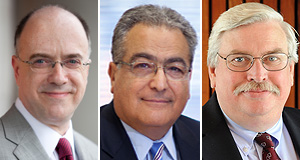
Stroke Consortium
Montefiore and Einstein Facilitate Consortium for Personalized Stroke Prevention and Treatment Efforts in Underserved Populations
NEW YORK (August 7, 2014) – Montefiore Health System and Albert Einstein College of Medicine of Yeshiva University announced that they will play a key role in establishing the New York City Collaborative Regional Coordinating Center (NYCC-RCC), the largest multi-institutional consortium ever dedicated to prevention, treatment, educational and rehabilitation efforts associated with stroke. The collaboration, funded through a $6 million grant from the National Institute of Neurological Disorders and Stroke (NINDS), merges research from Montefiore, Einstein, New York University-Langone, Icahn School of Medicine at Mount Sinai, North Shore-LIJ Health System, and other affiliated institutions. NYCC-RCC received one of 25 NINDS grants, to strengthen personalized stroke care for underserved populations. Almost 800,000 people suffer a stroke each year, but African Americans have nearly twice the risk for a first-ever stroke than Caucasians.

Mark Mehler, M.D. (left), Harry Shamoon, M.D. (middle), Brian Currie, M.D., M.P.H.The NYCC-RCC includes 17 stroke neurologists at these academic health centers who are committed to this broad-ranging initiative. Last year, these programs, which include Joint Commission certified Stroke Centers, recorded more than 4,300 stroke admissions. The diverse team of investigators will propose new clinical trials design, bring “bench-to-bedside” innovations to stroke research and conduct rigorous preclinical studies that can directly feed into Phase I clinical trials. The grant will also open the door for advanced educational programs and training for next generation multidisciplinary researchers in the field of cerebrovascular diseases.
“Our goal is to reduce the burden of stroke on people in the Greater New York City area and throughout the country by building on each partner’s expertise and patient experiences,” said Mark Mehler, M.D., chair, Department of Neurology, Montefiore and Einstein, and professor, neuroscience and psychiatry and behavioral sciences and the Alpern Family Foundation Chair in Cerebral Palsy Research, Einstein. “We will emphasize patient and provider education regarding common stroke risk factors like hypertension, as well as treatment and rehabilitation for both pediatric and adult stroke victims. Our hope is to advance culturally sensitive interventions and protocols for populations most at risk for stroke.” Dr. Mehler leads the Montefiore-Einstein NYCC-RCC team.
The investigators of the NYCC-RCC have unique expertise in recruiting underserved minorities to participate in clinical trials, which is important given that minorities in the U.S. have higher rates of stroke than non-Hispanic whites, and are historically underrepresented in stroke clinical trials. By sharing successes and lessons learned in study recruitment efforts, and bringing together a network of basic science, translational and clinical stroke researchers, efficiencies can be recognized and traditional barriers like time and expenses can be mitigated.
“Our goal is to reduce the burden of stroke on people in the Greater New York City area and throughout the country by building on each partner’s expertise and patient experiences.”
– Mark Mehler, M.D.
“Each of our academic medical centers has a rich history of providing high quality care and research for underserved populations,” said Harry Shamoon, M.D., professor of medicine, associate dean for clinical and translational research, and co-director of the Block Institute for Clinical and Translational Research at Montefiore and Einstein. “This grant allows Montefiore’s multidisciplinary teams to build on the American Heart Association’s NYC Stroke Task Force and to develop new therapies for stroke treatment in all populations, particularly acute-care interventions intended to prevent permanent brain injury.”
A centralized electronic medical database with sophisticated informatics will incorporate data on patient screening, recruitment efforts and study results. Data from each institution will be securely integrated using Montefiore’s advanced Clinical Research Informatics team. To facilitate the exchange of data and ideas, an online research data collaboration and education program also will be launched.
“The grant provides us an incredible opportunity to develop new stroke treatments and interventions which can translate into innovative clinical trials and critical new resources for patients,” said Brian Currie, M.D., M.P.H., vice president for medical research, Montefiore and professor, clinical medicine and of clinical epidemiology & population health and assistant dean for clinical research at Montefiore and Einstein. “We look forward to rolling out findings from NYCC-RCC phase II studies into a national pipeline of stroke studies and investigations.”
Other Top Stories
9/11 World Trade Center Exposure Linked to Heart Disease Among NYC Firefighters
On Becoming a Physician: New Einstein Students Receive White Coats and Stethoscopes
Novel Therapy for Acute Migraine Shows Promise in Phase 3 Clinical Trial
First Complete Wiring Diagram of an Animal's Nervous System
Multimillion Dollar NIH Grant to Help Reduce Opioid Use & Get Care to People Who Need It
NIH Grant Funds $23 Million Study of Diseases Affecting People Living with HIV
New TAILORx Data Guides Adjuvant Therapy in Younger Breast Cancer Patients
Einstein Celebrates Its 61st Commencement
Bolstering Biopsies: Testing Patients' Individual Cells to Guide Treatment



